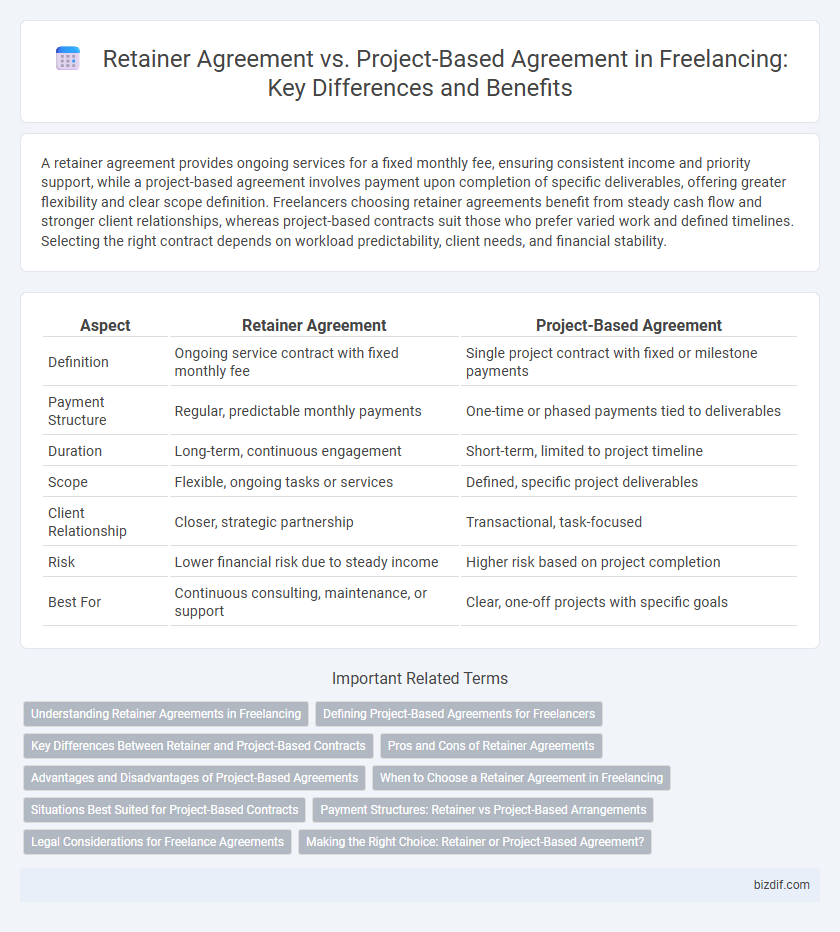A retainer agreement provides ongoing services for a fixed monthly fee, ensuring consistent income and priority support, while a project-based agreement involves payment upon completion of specific deliverables, offering greater flexibility and clear scope definition. Freelancers choosing retainer agreements benefit from steady cash flow and stronger client relationships, whereas project-based contracts suit those who prefer varied work and defined timelines. Selecting the right contract depends on workload predictability, client needs, and financial stability.
Table of Comparison
| Aspect | Retainer Agreement | Project-Based Agreement |
|---|---|---|
| Definition | Ongoing service contract with fixed monthly fee | Single project contract with fixed or milestone payments |
| Payment Structure | Regular, predictable monthly payments | One-time or phased payments tied to deliverables |
| Duration | Long-term, continuous engagement | Short-term, limited to project timeline |
| Scope | Flexible, ongoing tasks or services | Defined, specific project deliverables |
| Client Relationship | Closer, strategic partnership | Transactional, task-focused |
| Risk | Lower financial risk due to steady income | Higher risk based on project completion |
| Best For | Continuous consulting, maintenance, or support | Clear, one-off projects with specific goals |
Understanding Retainer Agreements in Freelancing
Retainer agreements in freelancing establish an ongoing relationship where clients pay a set fee for access to services over a specified period, ensuring predictable income and priority availability for the freelancer. These agreements often include predefined scope, response times, and deliverables, providing clarity and stability for both parties. Unlike project-based agreements, retainers emphasize consistent collaboration and long-term commitment rather than one-time task completion.
Defining Project-Based Agreements for Freelancers
Project-based agreements for freelancers define clear deliverables, timelines, and payment terms linked to specific tasks or milestones, ensuring transparency and scope clarity. These contracts minimize ambiguity by detailing the project scope, deadlines, and fixed or variable pricing based on project completion stages. Freelancers benefit from project-based agreements through predictable workload and payment schedules aligned with client expectations and project goals.
Key Differences Between Retainer and Project-Based Contracts
Retainer agreements provide ongoing freelance services for a fixed monthly fee, ensuring prioritized availability and consistent income, while project-based contracts involve payment upon completion of specific deliverables or milestones, offering flexibility but less predictability. Retainer contracts emphasize long-term client relationships and steady workload, often including predefined hours or services, whereas project-based agreements focus on defined scopes, timelines, and results for individual assignments. Understanding these distinctions helps freelancers optimize income stability, client management, and workload planning based on their business goals.
Pros and Cons of Retainer Agreements
Retainer agreements provide freelancers with steady income and stronger client relationships, ensuring prioritized work and ongoing collaboration. They may limit flexibility by locking both parties into fixed terms and can sometimes lead to less variety in projects. Retainers are ideal for sustained services but may create challenges in scope creep and adapting to changing client needs.
Advantages and Disadvantages of Project-Based Agreements
Project-based agreements offer clear scope definition and fixed pricing, providing clients with predictable budgets and freelancers with upfront payment security. However, they can limit flexibility for scope changes, often leading to scope creep or disputes if project requirements evolve beyond initial terms. These agreements are ideal for well-defined tasks but may cause challenges in projects requiring ongoing adjustments or collaboration.
When to Choose a Retainer Agreement in Freelancing
Opt for a retainer agreement in freelancing when consistent, ongoing work and predictable income are priorities, ensuring steady cash flow and long-term client relationships. This arrangement suits services requiring regular maintenance, updates, or continuous support, such as digital marketing, graphic design, or IT consulting. Retainer agreements foster trust and commitment, reducing the need for frequent renegotiation and streamlining project management.
Situations Best Suited for Project-Based Contracts
Project-based agreements are ideal when the scope and deliverables of a freelance job are clearly defined, such as designing a website or developing a mobile app. These contracts suit short-term assignments with specific deadlines, enabling clients to budget precisely and freelancers to focus on task completion without ongoing commitments. Small businesses and startups often prefer project-based contracts to evaluate freelancers' work before committing to longer-term arrangements.
Payment Structures: Retainer vs Project-Based Arrangements
Retainer agreements provide freelancers with consistent, predictable income by securing ongoing payments, often on a monthly basis, regardless of specific project completion. Project-based agreements tie payments directly to deliverables or milestones, offering flexibility but less financial stability during gaps between assignments. Choosing between these payment structures depends on the freelancer's preference for steady cash flow versus the potential for higher earnings through individual project negotiations.
Legal Considerations for Freelance Agreements
Retainer agreements offer ongoing legal protection by outlining consistent payment terms, scope of work, and termination clauses, reducing ambiguity in long-term freelance relationships. Project-based agreements require precise definitions of deliverables, timelines, and intellectual property rights to prevent disputes over project scope and ownership. Clearly defining confidentiality, liability, and dispute resolution mechanisms in both types of contracts ensures compliance and safeguards both parties legally.
Making the Right Choice: Retainer or Project-Based Agreement?
Choosing between a retainer agreement and a project-based agreement hinges on project scope, budget predictability, and long-term collaboration goals. Retainer agreements provide consistent revenue and ongoing service delivery, ideal for clients requiring continuous support and flexibility. Project-based agreements suit well-defined tasks with specific deliverables, offering clear timelines and payment structures that minimize risk for both freelancers and clients.
Retainer Agreement vs Project-Based Agreement Infographic

 bizdif.com
bizdif.com